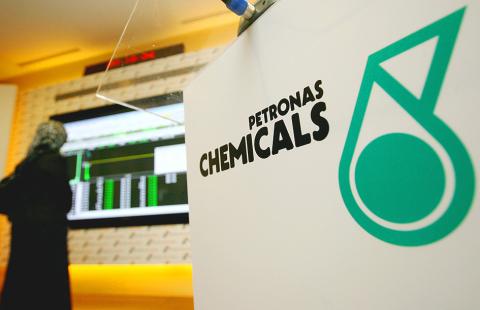The chemicals arm of Malaysian state energy firm Petronas raised US$4.1 billion on its stock market debut yesterday, in Southeast Asia’s biggest ever initial public offering (IPO).
Petronas Chemicals Group opened at 5.71 ringgit, a 9.8 percent premium on its institutional price. The result was at the top end of forecasts, reflecting strong demand for the region’s IPOs.
“It is an excellent price,” said George Ratilal, executive vice president for finance at Petronas.

PHOTO: AFP
“We are very, very satisfied with that,” he told reporters at the stock exchange.
The sale eclipses the US$3.3 billion launch of Malaysian mobile operator Maxis last year, and follows the successful offering of AIA, the Asian unit of troubled US insurer AIG, which raised US$20.5 billion dollars in Hong Kong this month.
Investors were attracted by a robust earnings outlook for the firm, a unit of Petroliam Nasional (Petronas), Malaysia’s only Fortune 500 company.
Petronas’ petrochemicals business includes 22 companies that produce chemical compounds, fertilizers, and industrial and specialty chemicals.
The sale is part of Malaysian Prime Minister Najib Razak’s ambitious Economic Transformation Program (ETP), a blueprint to revitalize the economy over the next decade and achieve developed-nation status by 2020.
The government is trying to energize the private sector by divesting some stakes in government-linked corporations, as well as adding much-needed depth and liquidity to the Malaysian bourse.
Yeah Kim Leng, group chief economist with RAM Holdings, said that Petronas Chemicals was drawing both long-term investors and the short-term “hot money” that is flowing into Asia’s more vibrant economies.
“Index-linked funds will have active interest in the stock, which will attract both domestic and foreign investors. It is an iconic stock which investors must have in their portfolio,” he said.
Ratilal was coy about speculation that Petronas, which has listed two subsidiaries this year, is preparing for further big sales.
“There is always speculation about this. Petronas is a large group. People look at some of our companies that we have which they think are right for floatation,” he said. “We are basically fundamentally driven. If we have companies which we think are ready, that can go to the market, that can be sustainable as a listing company, then we will look at it. And it has to be a balance of what is right for Petronas and what is right for the company itself.”
Analysts said the chemicals unit offering was well timed, coinciding with the current surge in global capital flows toward fast-growing emerging economies.
The listing involves the sale of a total of 2.48 billion shares, 72 percent of which are new shares and the remaining 28 percent of which are from parent Petroliam Nasional Bhd.
Malaysian pension funds were committed to taking 18 percent of the IPO. Another 37 percent will be offered to ethnic Malay investors, while 33 percent will be for book building and 12 percent for retail investors.
The Petronas Chemicals share price traded between 5.72 and 5.45 ringgit during the session and analysts said more volatility was expected as retail investors cashed in some profits.

Intel Corp chief executive officer Lip-Bu Tan (陳立武) is expected to meet with Taiwanese suppliers next month in conjunction with the opening of the Computex Taipei trade show, supply chain sources said on Monday. The visit, the first for Tan to Taiwan since assuming his new post last month, would be aimed at enhancing Intel’s ties with suppliers in Taiwan as he attempts to help turn around the struggling US chipmaker, the sources said. Tan is to hold a banquet to celebrate Intel’s 40-year presence in Taiwan before Computex opens on May 20 and invite dozens of Taiwanese suppliers to exchange views

Application-specific integrated circuit designer Faraday Technology Corp (智原) yesterday said that although revenue this quarter would decline 30 percent from last quarter, it retained its full-year forecast of revenue growth of 100 percent. The company attributed the quarterly drop to a slowdown in customers’ production of chips using Faraday’s advanced packaging technology. The company is still confident about its revenue growth this year, given its strong “design-win” — or the projects it won to help customers design their chips, Faraday president Steve Wang (王國雍) told an online earnings conference. “The design-win this year is better than we expected. We believe we will win

Quanta Computer Inc (廣達) chairman Barry Lam (林百里) is expected to share his views about the artificial intelligence (AI) industry’s prospects during his speech at the company’s 37th anniversary ceremony, as AI servers have become a new growth engine for the equipment manufacturing service provider. Lam’s speech is much anticipated, as Quanta has risen as one of the world’s major AI server suppliers. The company reported a 30 percent year-on-year growth in consolidated revenue to NT$1.41 trillion (US$43.35 billion) last year, thanks to fast-growing demand for servers, especially those with AI capabilities. The company told investors in November last year that

Power supply and electronic components maker Delta Electronics Inc (台達電) yesterday said it plans to ship its new 1 megawatt charging systems for electric trucks and buses in the first half of next year at the earliest. The new charging piles, which deliver up to 1 megawatt of charging power, are designed for heavy-duty electric vehicles, and support a maximum current of 1,500 amperes and output of 1,250 volts, Delta said in a news release. “If everything goes smoothly, we could begin shipping those new charging systems as early as in the first half of next year,” a company official said. The new